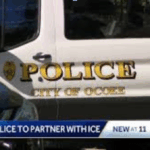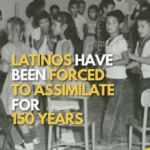Immigration in the U.S.
Presented By
Maribel: If you’ve been listening to the Pulso Podcast, you already know that we tell the stories from unheard voices and unheard perspectives very often. But one thing that you might be wondering is what is Pulso, and how did it all come about? So I brought it up in a production meeting and decided that we really needed to do an episode on that, which is why I wanted to talk to you, Liz.
Liz: Yeah I hadn’t even thought of it, Maribel, until you brought it up. We have an untold story about how we came to be. And that is what you all are about to hear on this episode.
You’re listening to the Pulso Podcast, we’ll be right back.
Episode
Maribel: Thank you so much for joining us and getting on a plane and flying all the way to Phoenix, Arizona, Liz!
Liz: I’m so excited to be here in person, Maribel!
Maribel: So Pulso, the media company. Liz, you started that as a project originally that became a company. Am I, am I right? Correct me if I’m wrong.
Liz: So the origin story is that we are born out of a media accelerator called Accelerate Change that has invested in other media outlets for marginalized groups that we know that the mainstream media is ignoring.
And they had developed this framework for engaging people online, where we’re spending most of our time — on our phone — to talk about the things that we’re not usually talking about for parents, for the Black community, and of course, Latinos had to be part of that mix. So Accelerate Change was like, “Hey, we need to start something for Latinos as well.”
They put out a job description for a new Latino-focused project, looking for someone with a background in fundraising and in media, and that was me. And it came at the perfect time, which we’ll talk about why the timing was-was right for me to engage in this work. And it’s now been five years since I founded Pulso.
Maribel: Wow. Okay. So let’s take it back because to me that is very fascinating. I know very little about that backstory cuz I came in once you guys already had Pulso the Podcast and of course the company was already going. You already had several other people and colleagues. Tell me what was the catalyst that led you to want to apply for that job?
Liz: So it gets a bit dark now but you know, of that tough time in our US history comes all of the innovation and the activism that we’re seeing in the last five years. So when I was at home watching the news, as I usually do with my background in journalism, I saw former President Trump launch his campaign with that line about Mexicans being rapists, and I was shocked.
I couldn’t believe that on CNN this person was getting so much attention. And in that moment I knew he was gonna make it far because he was speaking to this ugly side of us here in the US that had been dormant, but that I knew he was going to wake up and I knew I had to do something about it.
And that’s when I started telling my close network of colleagues and friends, “hey, I’m looking for a career change. And the goal is to do something to respond to this moment.” And that’s the very beginnings of the origin story of how we’re here.
Maribel: So the beginning started a little dark, but it got better, right? It got brighter. And that brightness was Pulso. And Pulso was born Project Pulso. Was it started on social media or was it started as an email list?
Tell us a little bit more about that.
Liz: Latinos actually happened to be one of the communities that is fastest-growing on mobile, we’re the fastest-growing demographic on social, we’re huge on Instagram. We’re huge on Facebook, Facebook Messenger, which is a space where we talk to our tías and our primos. And so when we were doing that research, We were like, “okay, if we’re going to create something to reach Latinos, we have to do it where they’re at, not just on their phone, but on the spaces that they’re actually spending their time.”
And it happened to be on the apps that we all now use every single day. So when thinking about that, it made sense to start the content that we were gonna do on social strictly.
So we started with Facebook Messenger in 2018. And it was really innovative in that time because when you think of Facebook Messenger, you think of, again, texting your tías, the meme, or like trying to contact somebody from high school. You’re not really thinking of reading articles in that format or taking political action in that space, which is also part of what Pulso does.
So that was a thought behind starting on social, which is meet your community where they’re at and talk to them in the spaces where they’re already spending their time.
Maribel: Fascinating that you started on Facebook Messenger. Tell me more about – I know the why, but tell me more about how that happened.
Liz: This goes back again to really the ingenuity of Accelerate Change. They had tested this digital organizing model with the other outlets that they were incubating.
So Parents Together and PushBlack serving parents and Black folks across the country. They tested this content model on Facebook Messenger and realized, hey, it feels really intimate, right? Because when PushBlack or Parents Together or Pulso sends you a message on Messenger, it’ll say, “Hey Maribel, it’s Liz.
Today’s story is about the history of Frida Kahlo, who’s behind us here on the couch.” Um, and when you are getting that kind of content, you’re able to click through in this, again, intimate inbox space, and so that was the first reason that you could scale an intimate relationship on a platform like that. But the second reason why scaling was really important is because I was mentioning earlier that the goal of our content is not just to inform and to talk about the things that mainstream media is ignoring, but also to organize nuestra gente.
So in Messenger, it’s very easy for you to click on a link and register to vote. It’s very easy for you to click on a link and sign a petition. It’s very easy for you to click on a button and commit to voting in every election or taking the census, and that’s a huge part of the mission of Pulso, Maribel. So, you only do those kinds of things when you have confianza, which is my favorite word in Spanish, which means that comfortability that you feel and that trust that you have in an outlet or in anything that you’re consuming.
And so that inbox, intimate space building confienza and rapport with nuestra gente in that platform, it just made for all of the right recipes to-to do this work.
Maribel: Did you have pillars in mind when you started creating the platform and developing the audience, essentially, for what became Project Pulso? Did you have any pillars in mind, like a specific set of guidelines that you knew you wanted to abide by and your team?
Liz: Well, I started as a solopreneur, so there was no team. It was just me, Liz, in 2018, trying to figure out what this was gonna be. And the first part of the work was to (to bring in some startupy jargon) is to find a value proposition, which is what are you actually gonna offer?
So it’s like, okay, we’re gonna create content for Latinos, but what are we gonna create? So the guidelines were to do a lot of deep listening to Latinos who we wanted to attract. And so what did I do? I got my iPad. I went to local colleges in Miami where I’m based, and I started asking people, “Hey, if you were to consume content for Latinos, what would you like to consume?”
And they would sit there in the college quad and answer my questions. And I would do the same with my family, with my friends, tell them to share with their family and friends. All Latinos of different ages to see, okay, what is actually missing?
When we did all of that customer discovery, what people were telling us is that they wanted culture stories and prideful contributions of what Latinos have done in the US as well as Latino history. Those are the things that we weren’t taught in school. Those are the things about being Latino in the US that we don’t know about.
Maribel: So you went and you listened to what the culture needed and the people wanted, and that’s exactly how you probably create a successful environment to grow. I mean, that’s – not probably – that’s exactly how you do it. That’s amazing. I think, I feel like when I came across Pulso for the first time, it was on Instagram and I just remember thinking, “this is actually kind of nice. I don’t see this stuff on the regular, on my newsfeed.” You know, usually, especially back then (and I wanna say this was probably closer to 2020) back then we were seeing a lot of negativity and a lot of, yes, a little bit of social activism, but it was mostly negative. And it was a moment of like, “oh, this is neat. Like this brings me back to my culture, but in a positive way.” Um, so I wanna thank you for that because that is a really powerful thing.
The project of the podcast is so important as well. The podcast has a way of reaching beyond the social media.
Now we are in people’s cars, in people’s commutes, uh, we go with you wherever you wanna go. What led you to wanna do the podcast?
Liz: That intimacy that I was talking about with Messenger goes even deeper when you’re in this medium and it allows us to go deeper on the topics that we are covering. When we do our brainstorming, we take inspiration from stories that have done really well on Instagram or in Facebook Messenger or that we get a lot of commentary. And that’s kind of how we also storyboard our episodes here. There are topics that merit a deeper, longer conversation.
And back to the data, we’re super data-driven at Pulso. Latinos happen to be growing on podcasts as well. And there’s still such a huge space in this world to fill for nuestra gente and we know, Maribel, since you and I started this co-hosting gig together, there have been dozens of new Latino podcasts that have come to be, that didn’t exist even back in 2020 when we started. So it’s great to see more content fill this space that we know is still — unfortunately, or by design — still dominated by White dudes. So it’s important for our voices and our stories to be told in this medium as well. And nuestra gente are listening.
Maribel: How about the format? Like how did that come about for the podcast? Because I know that one thing that makes it really special, at least to me, is the fact that we tell the unheard stories. We share those unheard voices and those stories that you didn’t learn from in history class. How did you come up with that?
Liz: The history content, Maribel, is super important. It’s a deep passion and commitment of mine and there is an enormous gap in the education that we don’t receive about what we represent in this country.
Latinos were here before the border, right? One of the things that we said on the Pulso Podcast is that the border crossed us. There’s 300, 400, 500 years of history of our communities being here before the US was even founded, that we’re not learning.
And actually there’s a recent study that just came out from Johns Hopkins University that says that 87% of curriculum in school don’t include anything about Latino history. That all of the syllabi that was researched actually only includes one major moment in Latino history, which was Sonya Sotomayor’s confirmation at the Supreme Court.
Imagine that. We’re nearly 20% of the population in the United States. We’re more than 60 million people, and our history books barely have anything about how we are shaping this country. And we’re engineers, we’re inventors, we’re astronauts, we’re business owners. We are, of course, leading in politics.
We’ve been pioneers in every single industry. And for that stat to show that our history has not been covered. It’s not taught in schools. That we can barely name any important icons beyond the same five that we always talk about (and you know I use that line often) is just so terrible.
So I give that backstory to say one thing that is super clear to me that I really wanted to make sure was present in our podcast is a history through line. And it doesn’t mean that every episode for all of our listeners – you know that we love to bring different formats into the mix, every episode will not be a straightforward history lesson – weather it’s context and the backstory of a social issue that we’re talking about, or a broader scope of why that issue is important, with a mix from primary sources to be talking about their stories, and you and I doing commentary on why this matters. That’s how we infuse that history through whatever format we bring.
And so, as long as there is that history through line, as I say, then we’re serving our community and filling that huge gap.
Maribel: And that first-person story format has been so valuable, I think, not just for me as a storyteller, but for a lot of people to listen to. Because the first story format allows us to share stories from unheard voices.
Those people that may not have ended up in any newspaper–
Liz: or in the history books!
Maribel: First of all, in the history books for sure, but maybe not even with a writeup on a newspaper or a-or a blog post about them. Nobody might have ever heard of them had we not done an episode on their story. I think we’re in a weird time where numbers are so important and big numbers and big audiences are the focus for everybody. That is so detrimental, unfortunately, to the stories of people because it does make a lot of people think that their stories don’t matter.
Because they’re not famous or because they don’t have a hundred thousand followers, but their stories do matter and I want our people, our gente like you always say nuestra gente, I want you all to know that your stories matter. And what I love about Pulso, not just Project Pulso, but the podcast as well, is that we do want to make sure that people know that, and we wanna tell those stories and keep telling them.
I think the stories that we tell are also about the life experiences that we live, and those experiences are what surpass and transcend all of the numbers, conversations and audience conversations. Those things don’t matter when it comes to the experiences that we can share because we are all learning from those experiences. And I think that’s so important.
Liz: Yeah. And as you’re saying that it brings me back to the core of why Pulso exists, Maribel. Which is that there are so few positive examples of our contributions, because there are so many examples of the negative stereotypes about Latinos still in mainstream media. So when you turn on CNN, or MSNBC, or Fox, or maybe even ABC, CBS, and NBC, if you connect a story to Latinos, you’re probably going to hear about the border and immigration. And those stories are probably not going to be about the dozens of amazing organizations and Latinos helping our brothers and sisters crossing over to get here safely and humanely. It’s probably going to be about the illegal this and the undocumented that, and we love all of our people regardless of their legal status. And also the way that the media paints us is as if we are only an immigration story. And within the immigration story there’s beauty and nuance. And also many Latinos did not immigrate here and our second, third, fourth, and fifth generation Americans.
And so when you see how one-dimensional the story about Latinos is in all of our outlets, it’s even more important for us to tell those specific stories of people in their own words. To share yes, the bad, but also the good and the joy and the positivity and the survival stories and the resilience and, and the success, right?
If you go to the Pulso Instagram, you are going to see some bad things that were done to Latinos in history because we also need to know that. But you will see many more stories about individual Latinos breaking barriers, breaking records, reaching milestones, and achieving the American dream, which is what so many of us are pursuing here.
Maribel: We’re already struggling with having to be in the history books, but now we have to struggle with getting erased period, or-or our story’s not being told at all, and not being allowed legally to be told in some schools. What is Pulso doing about that, if anything?
Liz: Reminding people that reading banned books is part of how we resist. So one of our stories that we shared recently was about the Latino books, Maribel, like you’re saying, that have been banned in states like Florida.
So what we see as our responsibility is to say, “Hey, you should know that these Latino stories are being taken away from schools so that you go to the bookstore and you buy them and you make sure your kids read them and that you’re reading them as well.”
Maribel: Okay. So Project Pulso is also about political organizing. Tell us a little bit about that and what you guys are doing to get people mobilized.
Liz: So we know that 2024 is yet another big election year, and what we do at Pulso is, yes, create content that is going to bring people in and bring pride and joy and inform.
But we then wanna leverage those digital relationships for you to take action and know where your voice can be heard and help you do exactly that. Again, straight from your phone.
And so we’ll do that by encouraging folks to commit to vote, setting a plan to vote, telling their family and friends that they’re gonna participate. We know that the most effective way to get you to vote is if you call your tía. Your tía calls your primo, el primo picks you up, you all go together to the voting booth. Y van en como and that’s how you participate.
So, we’ll continue to do those efforts on Messenger, on Instagram, everywhere where people consume Pulso content to invite people to show out because the power numbers that we have is already there. And what Pulso wants to do is not tell you who to vote for, but help you do it and help you tell your people through our outlets, with a share, with a comment, with a profile picture, sharing with your people that you’re excited about the election.
And 2024 is another period where we really wanna make sure that Latinos show out. We know we were decisive in 2020 and we wanna be decisive again. So that is part of the work that we’ll be doing. Whether it’s registering, sharing a link, asking for a vote by mail ballot. All from your phone, from all of our platforms. We’re gonna be sharing all of that in 2024.
Maribel: You said something really important. You said, we don’t tell you how to vote. And I think that’s so key because oftentimes we get lost in this whole, “oh, they are with them. We’re-we’re over here. We’re all separate.” And that’s been an issue obviously in the last few years in our country, in our world, really.
How is Pulso maybe working to unite us a little bit more rather than divide us as some would say?
Liz: Yeah. It’s such a tough climate. We’re so polarized, Maribel. It’s broken families, the current climate is preoccupying. And what we want to make sure to do at Pulso is, hey, we are unapologetic about our values. We believe in social justice and economic justice. We believe in humane immigration reform and LGBTQ+ rights and women’s rights.
And we believe in a future for our country where everyone has a place and a space and where Latinos can thrive. So we are unapologetic about those values and through sharing those real stories about people impacted by the dangerous laws being passed right now, and by sharing ways people can help and stop that, it is part of the work that we wanna do leading up to 2024 and beyond.
And another way that we wanna unite instead of divide is to also empower you to take action, right? I think that feeling helpless and hopeless and like, “oh, this is just more politics and I’m just so tired of it all” is not gonna get us anywhere. So helping give people the tools to say, “Hey, if you care about this issue, here’s how you can take action. So, those easy ways to help and sharing, again, the real stories of how folks are impacted and the values that we care about is how we plan to do that.
Maribel: What’s next for Pulso as a company and as a media source?
Liz: Oh, I would love for anywhere you were to be in the US where there are Latinos and you mention the name Pulso, to hear in the supermarket or down the street, “Oh my gosh, I just read a Pulso story. Oh my gosh I love Pulso!” So for me that means scaling. That means growing our audiences on every digital platform where there are Latinos.
My vision for Pulso is that. Is for you to go anywhere in the US where there are Latinos and they feel like there’s a story at Pulso that identifies them and that they can go to Pulso as a source for commentary, culture, history content that a accompanies them in their day-to-day media diet and audience members that we, through Pulso, can mobilize to continue to build our political power. So I think the scaling of the content in the audience goes with the scaling of the impact that we wanna have in 2024 and elections to come.
Maribel: Well, thank you so much for sitting down here in Phoenix with me to have this conversation. We’re literally sitting on the floor, so the audio quality might be a little bit different for you all this time, and that’s okay. We had to have this in person. We had to be able to see each other and look at each other in the eyes in live person so that we can have this conversation and enjoy it and share it with you all.
Thank you so much for being here. I mean, you literally almost flew across the country.
Liz: It is so, so nice to have done this in person and to sit back and talk about la rais, right? We are so often talking about all the topics and what does our audience wanna hear, but even talking about the origin story of Pulso for me is such a treat, and it takes me back to the why of, of what we’re doing Maribel. So thank you too for re-inspiring me to keep doing this work together with you and with the whole Pulso team.
This Episode was produced by Liz Alarcon, audio engineering & scoring by Charlie Garcia & Julian Blackmore, original music by Julian Blackmore. Our hosts are Liz Alarcon & Me, Maribel Quezada Smith
Latest News

Accessing asylum in the U.S. will now be harder than ever


Latinos Have Been Forced to Assimilate for 150 Years

“The Alien Enemies Act” is More Dangerous Than You Think

What’s the State of the Economy Before the Election?



